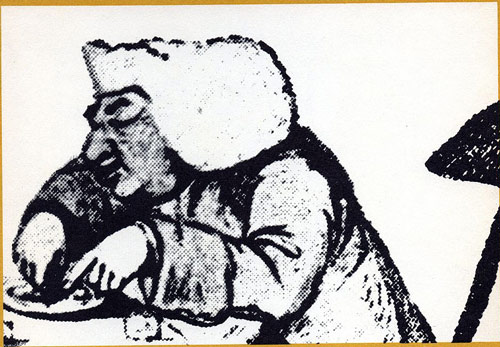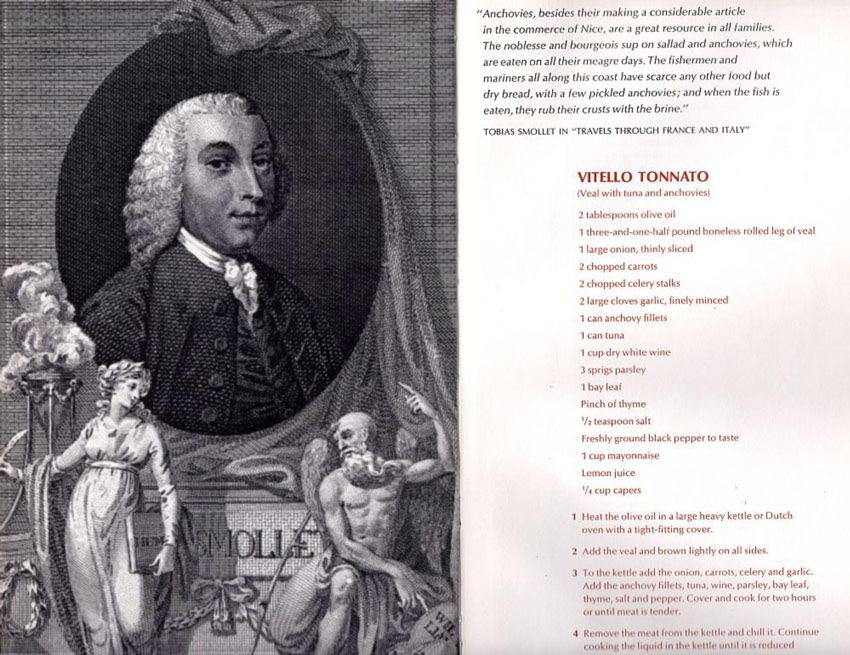Occasional miscellany: A Cookbook for Booksellers.
In 1965, The New York Times published A Cookbook for Booksellers. The Cookbook was compiled by Craig Claiborne who, according to the Times , held “an occupational fascination” for Francis Bacon.
Bacon had, among many other pithy things, written something to the effect that ‘reading maketh a full man.’ “Some books,” he did write, “are to be tasted, others to be swallowed, and some few to be chewed and digested.”

Contemplating these maxims, Claiborne in turn had suggested, again according to the Times, that ‘eating maketh a man full:’
“So he put aside his cooking and his other cookbooks to produce this little volume of a dozen recipes. They are designed especially to full the fulling bookseller. Sort of a tribute by one fulling expert to another.
We hope you taste, chew, swallow and digest these recipes with complete enjoyment.” (Claiborne 2)
If it is hard to understand what any of this has to do with selling books, or, if they did so, why its editors had decided to give the Cookbook to booksellers, it is just as hard to envision the Times indulging this kind of silliness today, an evolution of its norms outside the newsroom to be mourned.
As the Times disclosed, its little curiosity includes but twelve recipes and but for the illustrations would have covered less than half the length of its thirty-six pages. The recipes themselves, some of them anyway, appear to have been lifted from other books by Claiborne; although the Cookbook appeared but once, the frontispiece tallies copyrights from 1959, 1961, 1962 and 1963 in addition to 1965.
A literary quotation that inspired Claiborne accompanies each recipe except, unaccountably, the one for “A Version of Bookbinder’s Soup” that he considers “one of the few dishes that could be called a genuine Yankee institution,” which is not quite right. (Claiborne 29) Snapper soup is a Philadelphia institution, but it also is an institution in New Orleans and originated in eighteenth century London, where it became a staple, the staple, of the annual Lord Mayor’s Banquet.
The authors chosen by Claiborne are in the main unfashionable and irresistible, and so are most of his dishes. Of the eleven authors, seven are British and another pair adopted the archipelago as home. Perhaps a bigger surprise, the derivation of five recipes is unmistakably British and somewhat, another surprise, skewed toward Yorkshire, indications perhaps that British foodways continued to hold some degree of sway in midcentury America despite the depredations wrought by industrialization and rationing in the islands.
Byron precedes oyster stew; Thackeray a chicken curry; Clifton Fadiman, forgotten but for the gentle and generous memoir of his daughter Anne, Yorkshire buck; and Dr. Johnson the classic quadrumvirate of roast beef with thin and brown gravies, and Yorkshire pudding.
The quotation from the doctor is apt, “[a]ny of us would kill a cow rather than not have beef,” some of the others less so.
Norman Douglas offers a welcome and characteristic defense of booze and boozing to introduce Alsatian cherries drenched in Kirsch. Caroline Stacey described him in The Independent during 2006 as “a gamey old libertine who had decamped to Europe after allegedly molesting an under-age boy.” Elizabeth David would meet him in Antibes; he aged 72, she a palindromic 27. They became fast if unlikely friends, platonic lovers who cared nothing for convention and elevated selfishness to an ethos. Douglas inscribed the copy he gave her of Old Calabria , the source of Claiborne’s quotation:
“Do as you please, and send everybody to Hell, and take the consequences. Damn good Rule of Life.”
David in turn entitled her 1969 tribute to him “Have It Your Own Way,” and they did, with flamboyant affairs and epic bouts of drinking.

Smollett on anchovies.
Claiborne for the most part chose authors steeped in sensuality of one sort or another, Smollett along with Byron and Douglas the most sensual, not to say earthiest, of all.
In the Cookbook , however, Claiborne chooses a passage atypically mundane. Smollett (vitello tonnato, a good but nearly forgotten Italian dish introduced by an outstanding but nearly forgotten author) observes that anchovies, “besides their making a considerable article in the commerce of Nice, are a great resource in all families.” A Smollett snippet about chowder or sex may have been a better choice.
In another conflation of Italy with France, a quotation rendered in part in French from Henry James about the quality of eggs there, introduces Eggs Florentine. ( quoted at Claiborne 31, 35)
The other foreign resident of Britain is the estimable Marcel Boulestin, Great War hero, accomplished cookery writer and acclaimed restauranteur. His citation, “[i]t is not really an exaggeration to say that peace and happiness begin, geographically, where garlic is used in cooking,” amounts to a bit of a chestnut, but it makes a suitable introduction to the recipe Claiborne has chosen for him, “Chicken with 40 Cloves of Garlic.” ( quoted at Claiborne 24)
Fadiman turns a better phrase in the Cookbook , a reminder why his popularity had been untrammeled for years by the time it appeared:
“A cheese may disappoint. It may be dull, it may be naïve, it may be oversophisticated. Yet it remains cheese, milk’s leap toward immortality.” ( quoted at Claiborne 16)
He also, according to Claiborne, coined the term turophile “for a cheese lover.” (Claiborne 16) That is not quite right either. Most dictionaries date the term to 1938; some sources note that Fadiman popularized it during the 1950s, but none claims it originated with him.
No matter. The Cookbook is a lovely bagatelle, its recipes succinct and accessible.
The bfia version of Craig Claiborne’s recipe for Yorkshire buck appears in the practical ; an Appreciation of Marcel Boulestin appears in the lyrical.

